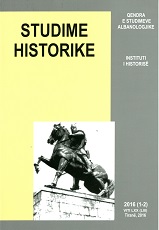Mbi disa Çështje të Kryengritjes Shqiptare të Vitit 1912
On some issues of the Albanian uprising in 1912
Author(s): Sali KadriaSubject(s): Military history, Political history, Social history, Recent History (1900 till today), Pre-WW I & WW I (1900 -1919), The Ottoman Empire
Published by: Qendra e Studimeve Albanologjike
Keywords: The Albanian uprising of 1912;
Summary/Abstract: The Albanian uprising of 1912 represents the culmination of the Albanian autonomist movement and final stage of the efforts of Albanian nationalism and this nation under the Ottoman Empire. The main factor that prompted Albanians to undertake the uprising of 1912 was the difficult situation in which they were after the victory of the Young Turk Revolution. The Ottoman ideology and centralizing policy taken by the Young Turks was the main factor for the aggravation of relations between two sides. The plan for the organization of the uprising adopted during a meeting of some key Albanian personalities in Taksim (Istanbul, Turkey) presented some weaknesses in itself because the participants did not analyze and presented possible scenarios of the upcoming uprising. On the other hand, some of the organizers of the uprising, as soon as arrived in Albania became more interested on the providing themselves as deputies in the Ottoman parliament and “forgot” the meeting’s decisions taken in Taksim. Unlike expected Austro-Hungary was against the Albanian uprising. It was to maintain the “status quo” of the Ottoman Empire. The Serbian government came about and tried to stay near to the leaders of the Albanian uprising in Kosova in order to incite against the Ottoman state and to prepare suitable ground for the invasion of these regions by her. From the meeting of Junik (Kosova) emerged two main currents of thought. The first current, maintained that the Albanians had to enlarge the insurrection for announcing the autonomy. Another current comprised of representatives, who were against the Albanian uprising or at least had joined the insurgency just to remove from the power the Young Turk government. The wording of the Albanians claims at the meeting of Junik to the Ottoman government was conducted in a more synthetic, with a clearer and more straight forward language compared to the text of the Memorandum of Greçe (Upper Shkodra). In our view, the cooperation of the Albanians with the Ottoman officers’ movement went through two stages. In the second stage, from the second half of July to August 1912, the cooperation of Albanians with Ottoman army officers went more in favor of the latter. The uprising extended from Presheva, Gjilan Mitrovica in the north to Korça, Kolonja and Chameria region in the south, but a greater intensity of Albanian uprising of 1912 remained in parts of Kosova. There were two main currents among the leaders of the uprising throughout the negotiations with the Ottoman government commission. The first current was composed of autonomy’s representatives; the second one consisted of reformists, who required putting aside the essential points of Albanian demands. On August 9, 1912, due to internal and external pressure, Hasan Prishtina gave a memorandum on behalf of the Albanians to Ibrahim Pasha, the head of the Ottoman commission which contained 14 requests. From the way how was formulated this platform, it seems that there is a tactical retreat by the Albanian nationalists. The contention of requests marks the transition from the idea of autonomy expressed in the paper, towards a practical and pragmatic action to achieve this status for Albanians. But, at the same time, it proves that Albanian nationalism was still weak because it lacked a unique attitude.
Journal: Studime Historike
- Issue Year: 2016
- Issue No: 01-02
- Page Range: 115-150
- Page Count: 36
- Language: Albanian
- Content File-PDF

